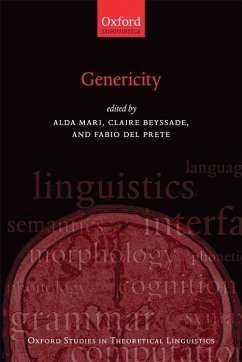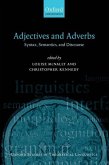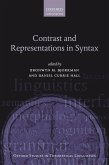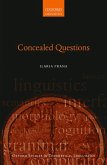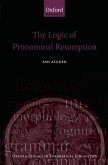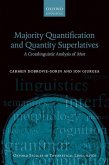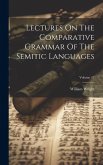Generality & Exception Ostl 43 C
Herausgeber: Mari, Alda; Del Prete, Fabio; Beyssade, Claire
Generality & Exception Ostl 43 C
Herausgeber: Mari, Alda; Del Prete, Fabio; Beyssade, Claire
- Gebundenes Buch
- Merkliste
- Auf die Merkliste
- Bewerten Bewerten
- Teilen
- Produkt teilen
- Produkterinnerung
- Produkterinnerung
This book provides an up-to-date introduction to the study of generics. It gathers new work from senior and young researchers and is organized along three main areas of study: the generic and individuals; genericity and time; and the sources of genericity and types of judgment.
Andere Kunden interessierten sich auch für
![Adjectives & Adverbs Ostl C Adjectives & Adverbs Ostl C]() McNally & KennedyAdjectives & Adverbs Ostl C226,99 €
McNally & KennedyAdjectives & Adverbs Ostl C226,99 €![Contrast & Repres in Syntax Ostl 75 C Contrast & Repres in Syntax Ostl 75 C]() Hall BjorkmanContrast & Repres in Syntax Ostl 75 C137,99 €
Hall BjorkmanContrast & Repres in Syntax Ostl 75 C137,99 €![Concealed Questions Ostl 65 C Concealed Questions Ostl 65 C]() FranaConcealed Questions Ostl 65 C132,99 €
FranaConcealed Questions Ostl 65 C132,99 €![Logic Pronominal Resumption Ostl 35 C Logic Pronominal Resumption Ostl 35 C]() AsudehLogic Pronominal Resumption Ostl 35 C132,99 €
AsudehLogic Pronominal Resumption Ostl 35 C132,99 €![Majority Quant & Quant Super Ostl P Majority Quant & Quant Super Ostl P]() Dobrovie-SorinMajority Quant & Quant Super Ostl P115,99 €
Dobrovie-SorinMajority Quant & Quant Super Ostl P115,99 €![The United States Democratic Review, Volume 43 The United States Democratic Review, Volume 43]() The United States Democratic Review, Volume 4340,99 €
The United States Democratic Review, Volume 4340,99 €![Lectures On The Comparative Grammar Of The Semitic Languages; Volume 43 Lectures On The Comparative Grammar Of The Semitic Languages; Volume 43]() William WrightLectures On The Comparative Grammar Of The Semitic Languages; Volume 4335,99 €
William WrightLectures On The Comparative Grammar Of The Semitic Languages; Volume 4335,99 €-
-
-
This book provides an up-to-date introduction to the study of generics. It gathers new work from senior and young researchers and is organized along three main areas of study: the generic and individuals; genericity and time; and the sources of genericity and types of judgment.
Hinweis: Dieser Artikel kann nur an eine deutsche Lieferadresse ausgeliefert werden.
Hinweis: Dieser Artikel kann nur an eine deutsche Lieferadresse ausgeliefert werden.
Produktdetails
- Produktdetails
- Verlag: Oxford University Press
- Seitenzahl: 458
- Erscheinungstermin: 1. März 2013
- Englisch
- Abmessung: 234mm x 155mm x 25mm
- Gewicht: 658g
- ISBN-13: 9780199691807
- ISBN-10: 0199691800
- Artikelnr.: 35331158
- Herstellerkennzeichnung
- Libri GmbH
- Europaallee 1
- 36244 Bad Hersfeld
- gpsr@libri.de
- Verlag: Oxford University Press
- Seitenzahl: 458
- Erscheinungstermin: 1. März 2013
- Englisch
- Abmessung: 234mm x 155mm x 25mm
- Gewicht: 658g
- ISBN-13: 9780199691807
- ISBN-10: 0199691800
- Artikelnr.: 35331158
- Herstellerkennzeichnung
- Libri GmbH
- Europaallee 1
- 36244 Bad Hersfeld
- gpsr@libri.de
Alda Mari is a CNRS researcher at the Jean Nicod Institute in Paris. She studied Latin, Greek, Sanskrit and linguistics and obtained a PhD at the EHESS in formal semantics. Her first appointment as CNRS researcher was at the Ecole Normale Supérieure des Télécommunications in computational linguistics. She has been visiting professor at CUNY for one year. She is the author of two books on comitativity and modality. Her work in lexical and formal semantics focuses on reciprocals, generics, comitative expressions and past modals. Claire Beyssade is a CNRS researcher at the Jean Nicod Institute in Paris. She obtained a PhD in formal semantics in 1994 at the University of Caen. Her work focuses on the semantics of noun phrases, on the study of presuppositions, implicatures and other projected contents, and more recently on the semantics of intonation. She is also interested in modelisation of interpretation in terms of interaction, in formal but not denotational frameworks. She is the author of one book on the semantics of propositional attitudes and of two books, in collaboration with Carmen Dobrovie-Sorin, on indefinites. Fabio Del Prete received his PhD in philosophy from the University of Milan in 2006. He is currently a researcher in natural language semantics at the CNRS laboratory CLLE-ERSS in Toulouse, France. His research interests lie in the domains of temporal and modal expressions. He has recently worked on the interaction between temporal connectives and scalar approximative adverbs, on issues of modality underlying future tensed sentences, and on imperfective aspect in connection with habituality.
* 1: Alda Mari, Claire Beyssade, and Fabio Del Prete: Introduction
* 2: Carmen Dobrovic-Sorin: Generic Plural and Mass Indefinites
* 3: Bert Le Bruyn, Min Que, and Henriëtte de Swart: The Scope of Bare
Nominals
* 4: Stefan Hinterwimmer: Free Relatives as Kind Denoting Terms
* 5: Gerhard Schaden: Two Ways of 'Referring to Generalities' in German
* 6: Nora Boneh and Edit Doron: Hab and Gen in the Expression of
Habituality
* 7: Patricia Cabredo Hofherr: Bare Habituals and Singular Indefinites
* 8: Fabio Del Prete: Imperfectivity and Habituality in Italian
* 9: Anastasia Giannakidou and Eleni Staraki: Ability, Action, and
Causation: From pure abilty to force
* 10: Paula Menédez-Benito: On Dispositional Sentences
* 11: Friederike Moltmann: On the Distinction between Abstract States,
Concrete States, and Tropes
* 12: Nicholas Asher and Francis Jeffry Pelletier: More Truths About
Generic Truth
* 13: Ariel Cohen: No Quantification Without Reinterpretation
* 14: Francis Corblin: The Roots of Genericity: Indefinite singulars vs
definite plurals
* 15: Manfred Krifka: Definitional Generics
* 16: Bernhard Nickel: Dutchman are Good Sailors: Generics and
gradability
* References
* Index
* 2: Carmen Dobrovic-Sorin: Generic Plural and Mass Indefinites
* 3: Bert Le Bruyn, Min Que, and Henriëtte de Swart: The Scope of Bare
Nominals
* 4: Stefan Hinterwimmer: Free Relatives as Kind Denoting Terms
* 5: Gerhard Schaden: Two Ways of 'Referring to Generalities' in German
* 6: Nora Boneh and Edit Doron: Hab and Gen in the Expression of
Habituality
* 7: Patricia Cabredo Hofherr: Bare Habituals and Singular Indefinites
* 8: Fabio Del Prete: Imperfectivity and Habituality in Italian
* 9: Anastasia Giannakidou and Eleni Staraki: Ability, Action, and
Causation: From pure abilty to force
* 10: Paula Menédez-Benito: On Dispositional Sentences
* 11: Friederike Moltmann: On the Distinction between Abstract States,
Concrete States, and Tropes
* 12: Nicholas Asher and Francis Jeffry Pelletier: More Truths About
Generic Truth
* 13: Ariel Cohen: No Quantification Without Reinterpretation
* 14: Francis Corblin: The Roots of Genericity: Indefinite singulars vs
definite plurals
* 15: Manfred Krifka: Definitional Generics
* 16: Bernhard Nickel: Dutchman are Good Sailors: Generics and
gradability
* References
* Index
* 1: Alda Mari, Claire Beyssade, and Fabio Del Prete: Introduction
* 2: Carmen Dobrovic-Sorin: Generic Plural and Mass Indefinites
* 3: Bert Le Bruyn, Min Que, and Henriëtte de Swart: The Scope of Bare
Nominals
* 4: Stefan Hinterwimmer: Free Relatives as Kind Denoting Terms
* 5: Gerhard Schaden: Two Ways of 'Referring to Generalities' in German
* 6: Nora Boneh and Edit Doron: Hab and Gen in the Expression of
Habituality
* 7: Patricia Cabredo Hofherr: Bare Habituals and Singular Indefinites
* 8: Fabio Del Prete: Imperfectivity and Habituality in Italian
* 9: Anastasia Giannakidou and Eleni Staraki: Ability, Action, and
Causation: From pure abilty to force
* 10: Paula Menédez-Benito: On Dispositional Sentences
* 11: Friederike Moltmann: On the Distinction between Abstract States,
Concrete States, and Tropes
* 12: Nicholas Asher and Francis Jeffry Pelletier: More Truths About
Generic Truth
* 13: Ariel Cohen: No Quantification Without Reinterpretation
* 14: Francis Corblin: The Roots of Genericity: Indefinite singulars vs
definite plurals
* 15: Manfred Krifka: Definitional Generics
* 16: Bernhard Nickel: Dutchman are Good Sailors: Generics and
gradability
* References
* Index
* 2: Carmen Dobrovic-Sorin: Generic Plural and Mass Indefinites
* 3: Bert Le Bruyn, Min Que, and Henriëtte de Swart: The Scope of Bare
Nominals
* 4: Stefan Hinterwimmer: Free Relatives as Kind Denoting Terms
* 5: Gerhard Schaden: Two Ways of 'Referring to Generalities' in German
* 6: Nora Boneh and Edit Doron: Hab and Gen in the Expression of
Habituality
* 7: Patricia Cabredo Hofherr: Bare Habituals and Singular Indefinites
* 8: Fabio Del Prete: Imperfectivity and Habituality in Italian
* 9: Anastasia Giannakidou and Eleni Staraki: Ability, Action, and
Causation: From pure abilty to force
* 10: Paula Menédez-Benito: On Dispositional Sentences
* 11: Friederike Moltmann: On the Distinction between Abstract States,
Concrete States, and Tropes
* 12: Nicholas Asher and Francis Jeffry Pelletier: More Truths About
Generic Truth
* 13: Ariel Cohen: No Quantification Without Reinterpretation
* 14: Francis Corblin: The Roots of Genericity: Indefinite singulars vs
definite plurals
* 15: Manfred Krifka: Definitional Generics
* 16: Bernhard Nickel: Dutchman are Good Sailors: Generics and
gradability
* References
* Index

